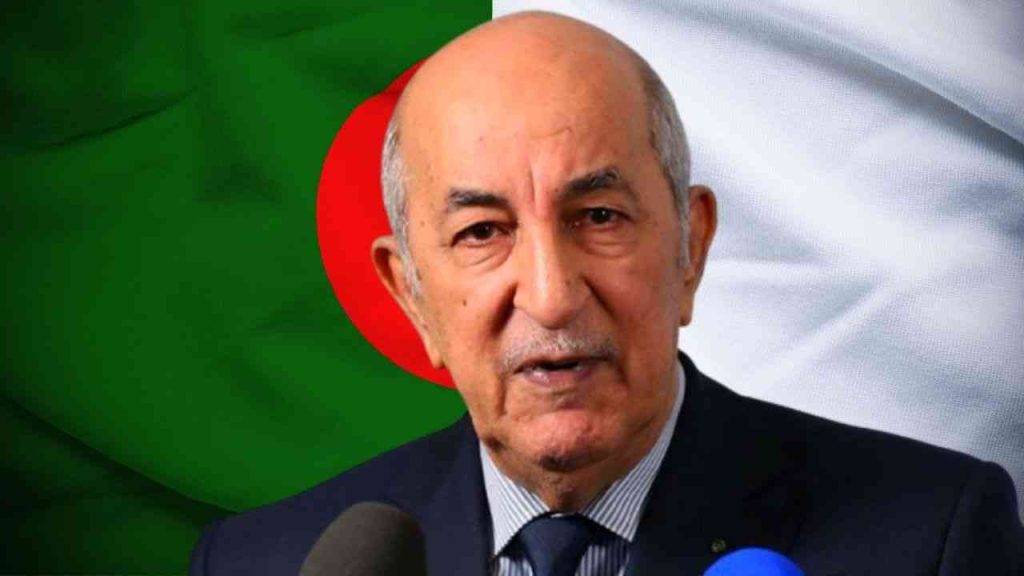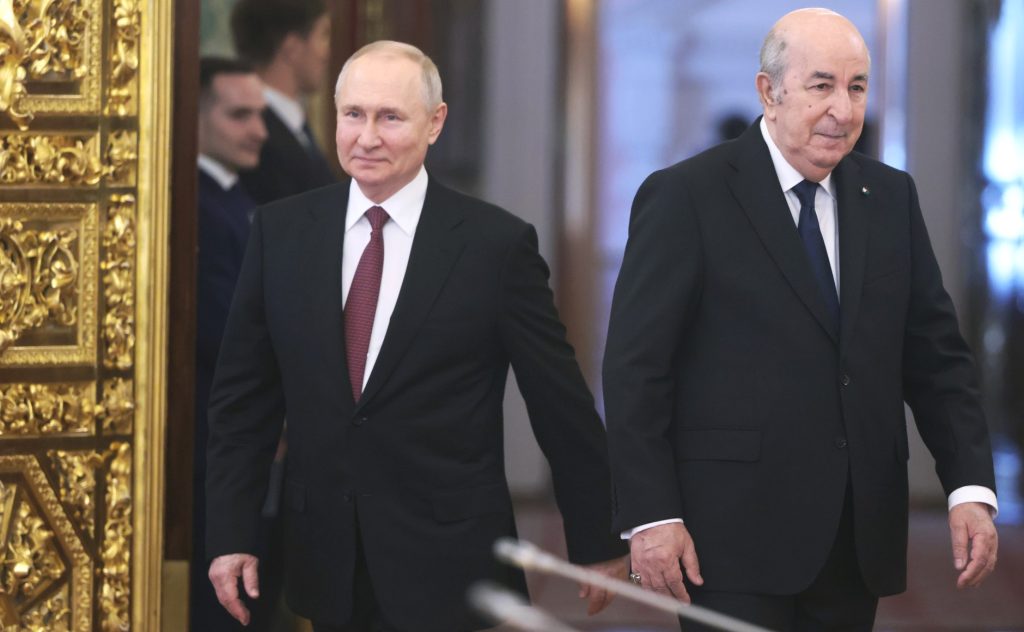
From TZBN Correspondent in Moscow.
Algerian President Abdelmadjid Tebboune and his delegation visited Russia from June 14 through 16, 2023, to forge strategic partnership between the two countries. While in Russia, President Tebboune pleaded with authorities there to help his country join the organization of developing nations called the BRICS.
He also encouraged the BRICS to speed up departure from the US dollar and the Euro.
The Algerian President revealed this in a statement describing the nature of his talks with Russian President Vladimir Putin. In the statement President Tebboune expressed deep satisfaction with this meeting, explaining that the meeting testifies to the depth of friendship that exists between Algeria and the Russian Federation.
“First, we must preserve our independence – thanks to the support of the Russian Federation, which provides us with weapons so that we can maintain our independence in these difficult conditions. We almost agreed – even before we started negotiations – on all the points that relate to the international situation,” he said.
“As you know, the situation is very tense. It is necessary that we speed up the process, that we enter the BRICS group and that we accept not dollars, not euros. This will be beneficial for Algeria,” he told Putin.
“As for the geopolitical situation…we must touch on the Libyan issue. Libya is a friend of Russia and Algeria, so we always want stability in this country. With regard to the Sahel region, we support the relations that exist between Mali and the Russian Federation. Mali is a neighbor of our country. In all conditions, we must talk and discuss all issues. We have an agreement called the Algiers Agreement,” he underlined in his speech in the Kremlin.
The Algerian President was in Moscow at the invitation of Russian President Vladimir Putin. The special invitation had been conveyed by Foreign Minister Sergey Lavrov during his visit to Algiers in May 2022 with the aim of strengthening relations of “friendship and cooperation” between the two countries.

The Algerian leader brought an extensive ministerial delegation to attend the 26th International Economic Forum (SPIEF)held at the ExpoForum Convention and Exhibition Centre in St. Petersburg, the second largest city in the Russian Federation.
There were two main significant points of this visit; these included Algeria’s intent to convince potential Russian investors about the economic opportunities available in this North African country and to make conscious attempts at seeking support for its ascension into the BRICS which includes Brazil, Russia, India, China and South Africa.
On June 14, Chairman of the Russian Delovaya Rossiya (Business Russia Association), Alexey Repik, stressed that “Russian business welcomes Algeria’s application for admission to the BRICS+ format,” but of course the final decision would be determined on the basis and criteria set by the BRICS. South Africa hosts the next BRICS summit in August in Johannesburg.
In a related development South Africa’s Ambassador to the Russian Federation, Mzuvukile Jeff Maqetuka, has affirmed the BRICS meeting will be held in Johannesburg, South Africa, and not anywhere else as speculated.
Recent reports had suggested that South Africa was considering relocating the summit to China in order to avoid dealing with the ICC’s warrant against Putin. It was issued in March on foot of allegations of war crimes. China, however, is not a party to the Rome Statute that established the ICC.
A Moscow-based South African Broadcasting Corporation (SABC) Correspondent reported on Saturday, June 17, 2023 Authorities in Russia were also considering to send a representative of President Putin to the South African BRICS summit instead of President Putin going there himself.
In an exclusive interview with TZBN Moscow Corresponded Kestér Kenn Klomegâh, Ambassador Maqetuka reiterated that South Africa values its relations with Russia and the BRICS. And that South Africa’s neutral position is consistent on all military conflicts around the world, and that the international community needs to work together to bring peace.
Maqetuka further explained that South Africa is committed to the articles of the United Nations (UN) Charter, including the principle that all members shall settle their international disputes by peaceful means. Since the dawn of democracy in South Africa almost 30 years ago, we have called for the reform of the United Nations and multilateral organisations to make such structures more representative, inclusive of African representation.
“South Africa is a sovereign state, governed by a democratic Constitution and committed to the consistent application of international law. We will continue to fulfil our obligations in terms of the various international agreements and treaties to which we are signatories,” he underlined in the interview with this article author.
Speaking particularly on the Russia-Ukraine conflict, Maqetuka said “the international community needs to urgently achieve a cessation of hostilities and to prevent further loss of life and displacement of civilians in Ukraine. It needs to support meaningful dialogue towards lasting peace, which ensures the security and stability of all nations.”
“We support the principle that members should refrain from the threat or use of force against the territorial integrity or political independence of other states. The South African position seeks to contribute to the creation of conditions that make the achievement of a durable resolution of the conflict possible.” the top diplomat added.
Speaking also to RT on Friday, Mzuvukile Jeff Maqetuka said plans for the gathering between August 22 and 24 in Johannesburg were well underway. South Africa will host the 15th annual BRICS summit this August, the country’s ambassador to Russia has confirmed, dismissing speculation that it may be moved elsewhere due to an International Criminal Court (ICC) warrant for the arrest of Russian President Vladimir Putin.
Maqetuka said Pretoria understands its international obligation as a signatory of the statute, but that there were no plans to move the event to another nation. “South Africa has made it very clear,” he said, adding that Pretoria is engaging “with all parties” in relation to the ICC warrant. “The position still remains as far as South Africa is concerned; the summit would be held in Johannesburg as has been agreed on,” Maqetuka told RT.
Earlier this month, South African Deputy Minister Obed Bapela said the country was making legislative changes to make its national laws outrank the ICC. The law currently obliges Pretoria to arrest Putin if he touches down in the nation for the BRICS summit. The changes would mean South Africa can “give itself exemptions of who to arrest and who not to arrest,” Bapela told the BBC.
Maqetuka noted that the government has already granted diplomatic immunity to foreign officials attending the upcoming BRICS meetings, a move which was announced by the Foreign Affairs Ministry late last month. This is all done “within the framework of the ICC,” he said.
The diplomat also emphasized his country’s non-aligned stance on the Ukrainian conflict, pointing out that this is nothing new, but is based on its history as a member of the Non-Aligned Movement (NAM). NAM was founded in 1961 to chart an independent course in global politics, preventing member countries from becoming players in struggles among major powers. “South Africa has always taken a non-aligned position. It is a continuation of the position of South Africa,” he said, noting that this is the case “especially where there are military conflicts.” According to Maqetuka, this position has never jeopardized South Africa’s trade relations with other countries around the world.



